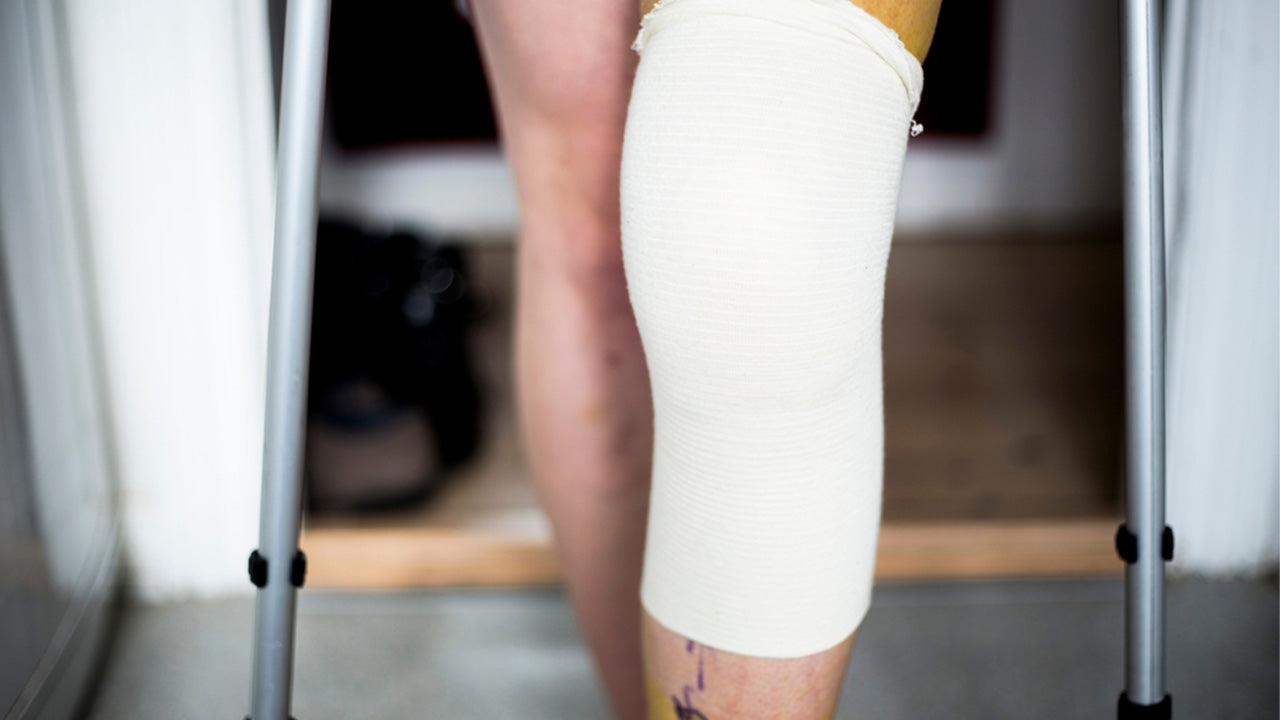How Amino Acids Can Reduce Torn Meniscus Swelling and Pain
 By: by Amino Science
By: by Amino Science

Did you recently injure your knee playing a contact sport? Did you shift your body abruptly and feel a popping sensation? Has your knee started to swell or feel stiff? You may have a meniscus tear. Your first stop should be to a primary provider, orthopedic surgeon, or sports medicine specialist. Since many meniscus tears heal on their own, you may be sent home to rest up and recuperate. Amino acid supplementation can help make torn meniscus swelling and pain more manageable.
What Causes Torn Meniscus Swelling?
There are two pieces of cartilage called menisci on the medial and lateral sides of your knee joint (between your femur, or thigh bone, and your tibia, or shin bone), that cushion it from shock and wear and tear. They're called shock absorbers for this very reason!
One of the most common knee injuries, a torn meniscus can be caused by a forceful twist or turn during a sporting event such as basketball or soccer, or by degenerative wear and tear from age or osteoarthritis.
Diagnosis and Symptoms of a Torn Meniscus
A popping sensation, knee pain, a locked knee, stiffness or swelling are all signals of a meniscus injury. A trip to the doctor for a physical exam and imaging tests are in order. Some X-rays will help rule out other knee injuries, such as an anterior cruciate ligament (ACL) injury, while magnetic resonance imaging (MRI) can determine if the source of the pain is indeed a torn meniscus with 70-90% accuracy.
Torn Meniscus Treatment Options
If your MRI shows a meniscus tear of Grade 1 or 2, your orthopedic doctor will likely choose a nonsurgical treatment option: rest, ice, elevate, compress, medicate. Grade 3 meniscal tears are more serious and diagnosed with a knee arthroscopy. This type of meniscus tear will likely require surgery.
- Arthroscopic surgery: Your surgeon inserts an arthroscope into the knee to examine the tear. Two more small incisions are made for the appropriate surgical instruments to repair the tears.
- Arthroscopic partial meniscectomy: This surgical procedure removes a small part of the meniscus.
- Arthroscopic total meniscectomy: If there is a large tear in the outer portion of the meniscus, your surgeon may opt for total removal of the meniscus.
If you have a Grade 1 or 2 meniscus tear you may not require knee surgery and will be sent home to heal naturally with some rest and physical therapy. Read this article for tips.
For more information on how amino acids can reduce torn meniscus swelling and pain and accelerate meniscus repair, then stick with us here!
Amino Acids for Torn Meniscus Swelling and Pain
The commonly prescribed treatment for torn meniscus swelling and pain are non-steroidal anti-inflammatory medications (NSAIDs) such as ibuprofen and naproxen. These aren’t always well tolerated, and when consumed too regularly can cause serious side effects, including:
- Stomach aches
- Indigestion
- Diarrhea
- Stomach ulcers
- Headaches
- Dizziness
- Drowsiness
- Allergic reactions
- Liver, heart, or kidney issues
Amino acids can complement the anti-inflammatory and pain-relieving effects of over-the-counter or prescription medications, and can even act as stand-ins for them.
Your body tissues, which include your menisci, are made of proteins like collagen. And amino acids make up these very proteins. Which is why supplementing with them helps to speed wound healing and repair.
Essential amino acids, the type of amino acids your body cannot make and can only get through diet and supplementation, are proven to help heal injured cartilage.
Essential amino acids go even further by helping to protect against the loss of muscle tissue that occurs during periods of rest and inactivity. A torn meniscus can have you down for the count for at least a month. Supplementing with essential amino acids helps ensure muscle protein synthesis stays active and boosts your chances of a full meniscus recovery (1).
As for the pain and swelling, essential amino acids are proven to subdue inflammation, keeping it in check so it doesn’t slow down healing (2).
Essential amino acid supplementation is imperative for both the patient who is healing naturally and the patient who requires surgical repair. Take a look at the science: patients who supplemented with essential amino acids a week before and at least 3 months after total knee replacement surgery had a speedier recovery.
We are committed to making health care and medicine affordable and accessible to everyone. That’s why we partnered with the leading amino acid researchers to patent the very formula of healing amino acids that has been proven to:
- Keep inflammation in the healthy ranges
- Stimulate muscle growth and repair 3 times more than any other protein source
- Preserve muscle mass during periods of bed rest and inactivity
- Improve physical strength and function 6 weeks after surgery or injury
This patented formula is called Heal, and it is only available from The Amino Company. Click here to learn more about this natural essential amino acid supplement.

Don’t Forget RICE!
As well as following medical advice and feeding your body the essential amino acids and nutrients it needs to heal—vitamin C, vitamin D, zinc, and omega-3s—it is important to:
- Rest
- Ice
- Compress
- Elevate
Use crutches to give your knee injury a chance to heal, and don’t play sports until all the symptoms of a meniscus tear have subsided—you’ve regained range of motion and there is no pain when you put weight on the knee or rotate it even slightly.
Here’s to a speedy meniscal repair!



 833-264-6620
833-264-6620


















